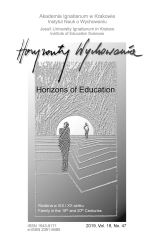Patriarchy and the (late)Victorian Middle-Class Family Reconsidered
Abstrakt
RESEARCH OBJECTIVE: The aim of the article is to examine the relations within an upper middleclass
family – as depicted by Virginia Woolf in a collection of autobiographical essays, Moments of
Being – and compare these against the patriarchal model. The ultimate aim is to expose and locate,
as early as the last decade of the Victorian era, the signs that a transformation was about to occur.
THE RESEARCH PROBLEM AND METHODS: The Victorian paradigm of the patriarchal roles
of pater familias and mater familias has been analyzed. In conformity with philological methods,
appropriate literary evidence is provided.
THE PROCESS OF ARGUMENTATION: The article first focuses on the concept of the Victorian
pater familias and mater familias. It presents an analysis of the Stephens family who feature in Moments
of Being. A traditionally conservative perspective with regard to the male family members is
juxtaposed with the contrasting viewpoint voiced by the author of the collection.
RESEARCH RESULTS: The analysis of the autobiographical essays reveals certain shifts in the
roles of the Victorian pater familias and mater familias in late-Victorian times. Furthermore, certain
rifts in familial relations are uncovered and investigated with reference to differing attitudes to the
issue of female education.
CONCLUSIONS, INNOVATIONS, AND RECOMMENDATIONS: The analysis exposed several
fissures in the patriarchal model and located these at an earlier date than commonly accepted. It
also demonstrated that the first signs of the transformations that would occur in British society were
particularly noticeable in the novel attitudes to the question of female education. This may encourage
further research of contemporary perspectives on institutional instruction.
Bibliografia
Booth, A. (2016). Woolf and Biography. In: Jessica Berman (ed.) A Companion to Virginia Woolf, Oxford: Wiley-Blackwell, 13 – 26.
Caserio, R.L. (ed.) (2009). The Cambridge Companion to the Twentieth-Century English Novel.Cambridge: Cambridge University Press.
Giddens, A. (2006). Sociology. Cambridge: Polity Press.
Grimal, P. (1994). Seneka. [Seneca]. Warszawa: Państwowy Instytut Wydawniczy.
Guest, K. (2007). The Subject of Money: Late-Victorian Melodrama’s Crisis of Masculinity. In: Victorian Studies, vol. 49/4, 635 – 657. Retrieved from: https://www.jstor.org/stable/4626371.
Huchthausen, L. (ed.) (1988). Die Frau in der Antike. [Woman in Antiquity]. Stendal: Winckelmann-Geselschaft.
Foucault, M. (1978). The History of Sexuality. (trans.) R. Hurley. New York: Pantheon Books.
Kulesza, R. (ed.) (2012). Słownik kultury antycznej. [Dictionary of Ancient Culture], Warszawa: Wydawnictwo Uniwersytetu Warszawskiego.
Levine, P. (1990). “The Humanising Influences of Five O’Clock Tea”: Victorian Feminist Periodicals. In: Victorian Studies, vol. 33/2, 293 – 306. Retrieved from: https://www.jstor.org/stable/3828360.
Peterson, L.H. (1999). Traditions of Victorian Women’s Autobiography. The Poetics and Politics of Life Writing. Charlottesville & London: The University Press of Virginia.
Plezia, M. (ed.) (1999). Słownik łacińsko-polski. Tom IV [ Latin-Polish Dictionary. Volume IV]. Warszawa: PWN.
Piszczek, Z. (ed.) (1990). Mała encyklopedia kultury antycznej [Minor Encyclopedia of Ancient Culture]. Warszawa: PWN.
Saller, R.P. (1999). Pater Familias, Mater Familias, and the Gendered Semantics of the Roman Household. In: Classical Philology, vol.94/2, 182 – 197. Retrieved from: https://www.jstor.org/stable/270558.
Schwartz, L. (2011). Feminist thinking on Education in Victorian England. In: Oxford Review of Education, vol. 37/5, 669 – 682. Retrieved from: https://www.jstor.org/stable/23119462.
Woolf, V. (1985). A Sketch of the Past. In: Moments of Being. A Collection of Autobiographical Writing. J. Schulkind (ed.). San Diego, New York & London: Harcourt, 61 – 160.
Woolf, V. (1985). 22 Hyde Park Gate. In: Moments of Being. A Collection of Autobiographical Writing. J. Schulkind (ed.). San Diego, New York & London: Harcourt, 162 – 179.
Woolf, V. (1984). On Not Knowning Greek. In: The Common Reader. A. McNeillie (ed.). San Diego, New York & London: Harcourt, 23 – 38.
Walbys, S. (1990). Theorizing Patriarchy. Oxford: Basil Blackwell.
Walbys, S. (2003). Gender Transformations. London and New York: Routledge.
Żarnowska, A., Szwarc, A. (eds.). (2006). Kobieta i rewolucja obyczajowa. Społeczno-kulturowe aspekty seksualności. Wiek XIX i XX [Woman and Social Revolution. Socio-Cultural Aspects of Sexuality in the 19th and 20th centuries]. Warszawa: DiG.
Copyright (c) 2020 Sylwia Janina Wojciechowska

Utwór dostępny jest na licencji Creative Commons Uznanie autorstwa – Bez utworów zależnych 4.0 Międzynarodowe.
Uwagi dotyczące praw autorskich
Autorzy publikujący w tym czasopiśmie wyrażają zgodę na następując warunki:
- Autorzy zachowują prawa autorskie, przyznając czasopismu prawo do pierwszej publikacji swojego tekstu jednocześnie zarejestrowanego pod numerem licencji CC BY-ND, która pozwala innym na korzystanie z tego tekstu z uznaniem autorstwa tekstu oraz pierwotnej publikacji w tym czasopiśmie.
- Autorzy proszeni są o nawiązywanie odrębnych, dodatkowych porozumień wynikających z umowy, dotyczących dystrybucji opublikowanej w czasopiśmie wersji tekstu nie na prawach wyłączności (np. opublikowanie go w repozytorium instytucji lub w innym czasopiśmie), z potwierdzeniem pierwszej publikacji w tym czasopiśmie.
Wyraża się zgodę i zachęca autorów do publikacji ich tekstu w Internecie (np. w repozytorium instytucji lub na jej stronie internetowej) przed lub podczas procesu składania tekstu jako, że może to prowadzić do korzystnych wymian oraz wcześniejszego i większego cytowania opublikowanego tekstu (Patrz The Effect of Open Access). Zalecamy wykorzystanie dowolnego portalu stowarzyszeń badawczych z niżej wymienionych:





